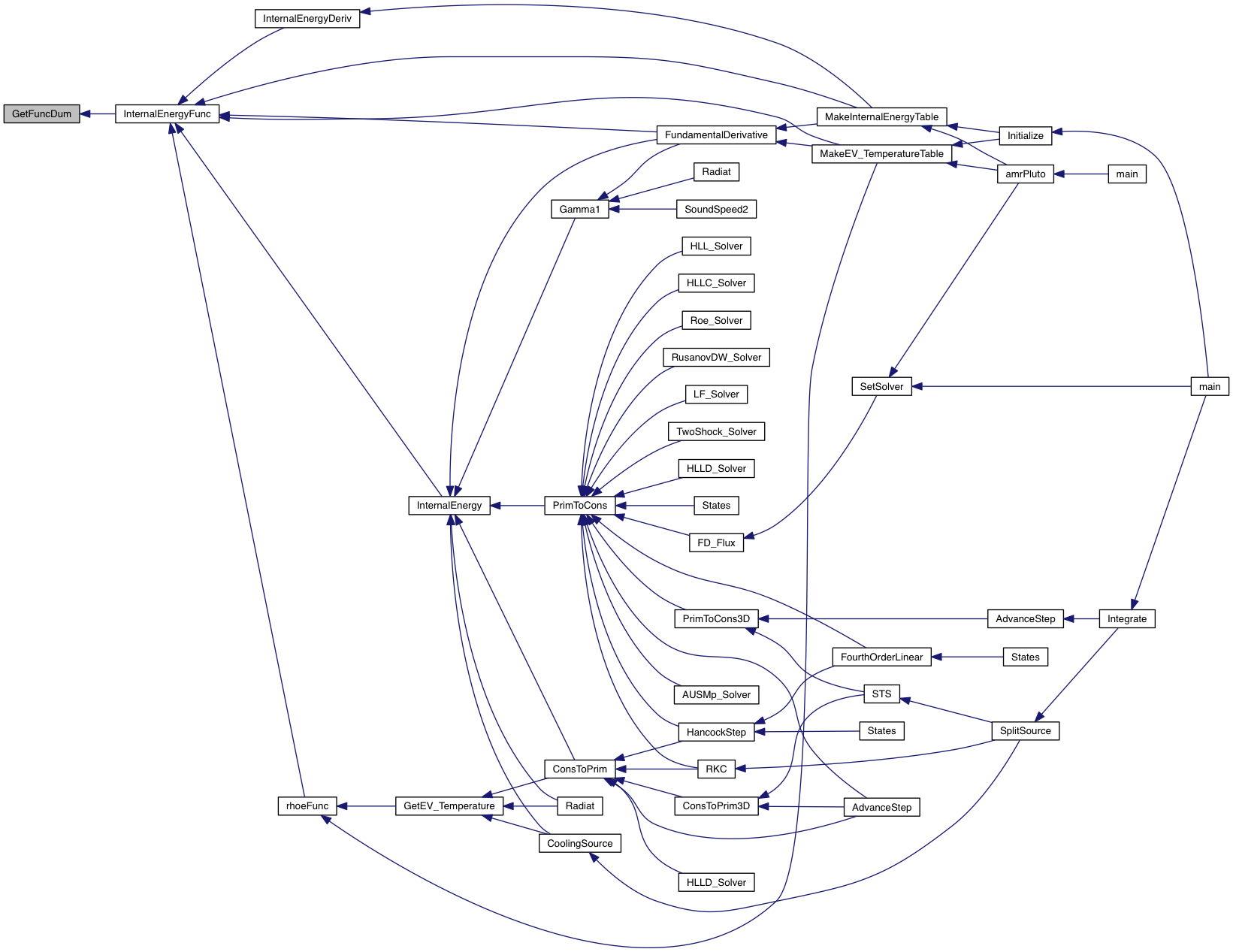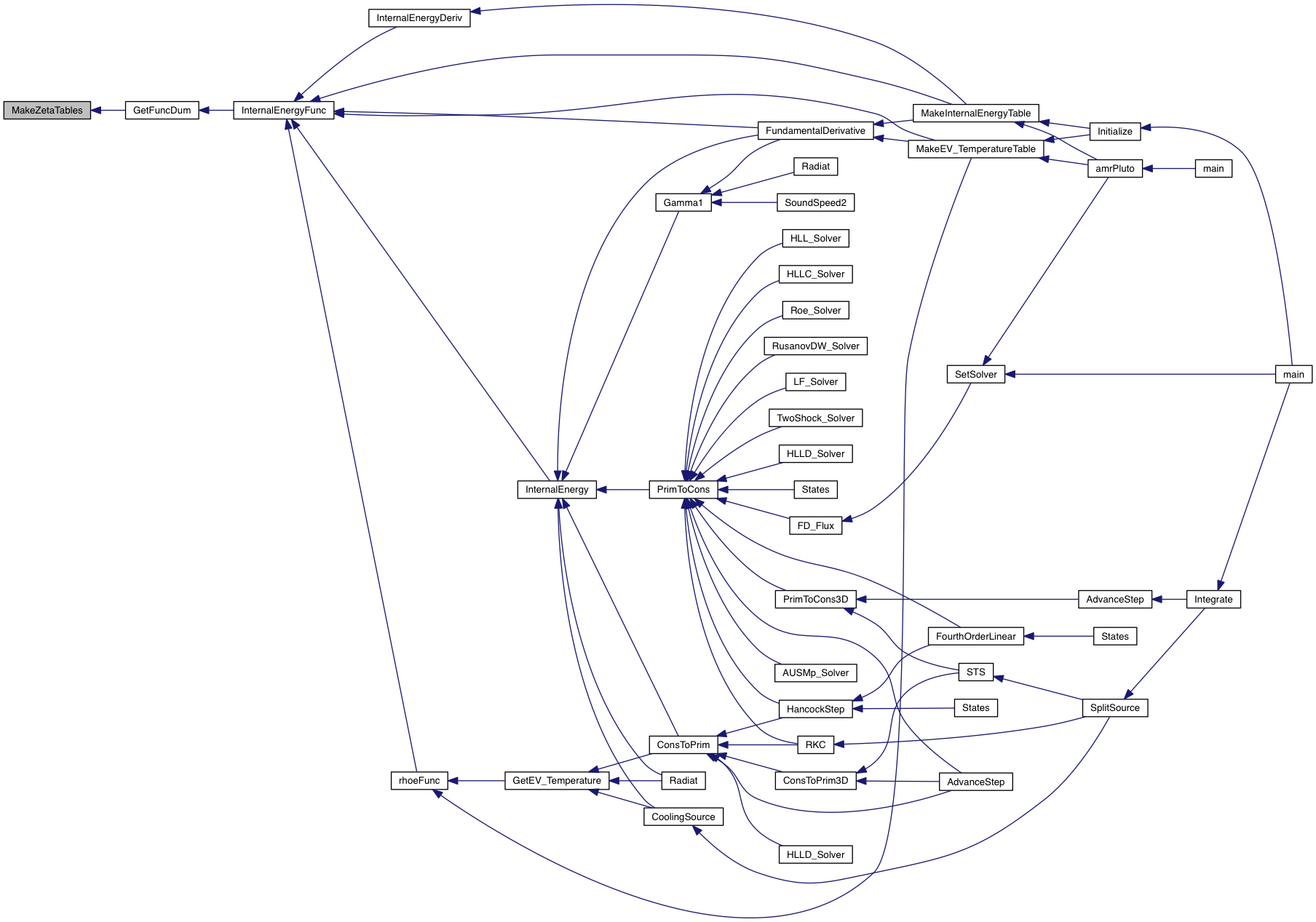|
PLUTO
|
|
PLUTO
|
#include "pluto.h"
Go to the source code of this file.
Macros | |
| #define | THETA_V 6140.0 |
| #define | THETA_R 85.5 |
| #define | ORTHO_PARA_MODE 1 |
Functions | |
| static void | MakeZetaTables (double *, double *, int) |
| void | GetFuncDum (double T, double *funcdum_val) |
| #define ORTHO_PARA_MODE 1 |
Definition at line 13 of file zeta_tables.c.
| #define THETA_R 85.5 |
Definition at line 7 of file zeta_tables.c.
| #define THETA_V 6140.0 |
Definition at line 6 of file zeta_tables.c.
| void GetFuncDum | ( | double | T, |
| double * | funcdum_val | ||
| ) |
Interpolate the value of a function of zetaR from the table that is used to estimate the value of EH2.
| [in] | T | Value of temperature in kelvin. |
| [out] | *funcdum_val | Pointer to the value of function of zetaR |
Reference: D'Angelo, G. et al, ApJ 778 2013.
Definition at line 16 of file zeta_tables.c.


|
static |
Compute tables from iterative summation involed to estimate partition function of parahydrogen (  ) and orthohydrogen (
) and orthohydrogen (  ) and their derivatives with respect to temperature. Then further estimate
) and their derivatives with respect to temperature. Then further estimate  and finally the function of
and finally the function of  that goes into the estimation of EH2. The partition function and its derivative can be written as
that goes into the estimation of EH2. The partition function and its derivative can be written as
![\[ \left\{\begin{array}{l} \zeta = \DS \sum_i a_ie^{-b_i/T} \\ \noalign{\medskip} \zeta' = \DS \frac{1}{T^2}\sum_i a_ib_ie^{-b_i/T} \end{array}\right. \]](form_26.png)
where i=0,2,4,... is even for parahydrogen while i=1,3,5,... is odd for orthoyhdrogen. One can see that in the limit of zero temperatures,  while
while  . Then
. Then  is ill-defined in the low temperature limit since it becomes
is ill-defined in the low temperature limit since it becomes 0/0. To avoid this, we rewrite zetaO by extracting the first term from the summation:
![\[ \left\{\begin{array}{l} \zeta_O = \DS e^{-b_1/T}\sum_i a_ie^{-\Delta b_i/T} \\ \noalign{\medskip} \zeta'_O = \DS \frac{1}{T^2}e^{-b_1/T} \left[ b_1 \sum_i a_ie^{-\Delta b_i/T} +\sum_i a_i\Delta b_ie^{-\Delta b_i/T}\right] \end{array}\right. \]](form_30.png)
where  . Taking the ratio:
. Taking the ratio:
![\[ \frac{\zeta'_O}{\zeta_O} = \frac{1}{T^2} \frac{ b_1 \sum_i a_ie^{-\Delta b_i/T} + \sum_i a_i\Delta b_ie^{-\Delta b_i/T}} {\sum_i a_ie^{-\Delta b_i/T}} \qquad\Longrightarrow\qquad \frac{\zeta'_O}{\zeta_O} - \frac{b_1}{T^2}= \frac{1}{T^2} \frac{\sum_i a_i\Delta b_ie^{-\Delta b_i/T}} {\sum_i a_ie^{-\Delta b_i/T}} \to 0 \quad{\rm as}\quad T\to 0 \]](form_32.png)
The expression on the right (that appears in the computation of  ) is now well-behaved and it reproduces the low temperature limit correctly. You can convince yourself by playing with the following MAPLE script
) is now well-behaved and it reproduces the low temperature limit correctly. You can convince yourself by playing with the following MAPLE script
| [in] | lnT | Array of Logrithmic values of Gas temperatures from 0.01 K to 10^12 K. |
| [in] | nsteps | Number of equal spacings in T. |
| [out] | funcdum | The function of zetaR that goes into EH2. |
Reference:
Definition at line 73 of file zeta_tables.c.

